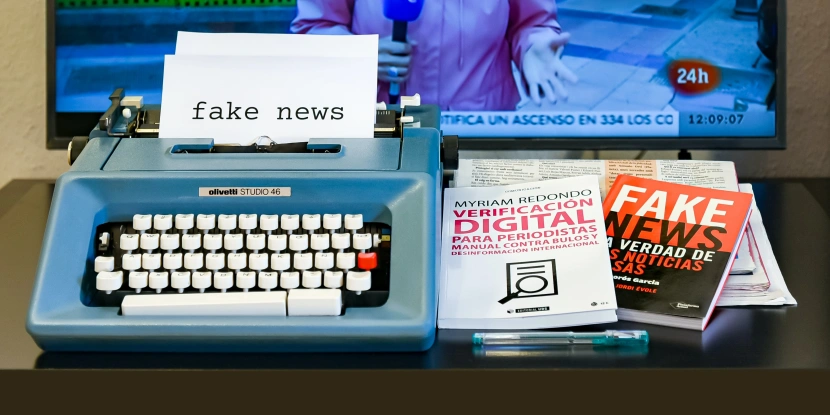Fake news is ammunition. Government and NGOs warn of misinformation

Fake news is ammunition. Government and NGOs warn of misinformation
For months, we have seen increasing misinformation online, especially in social media.

The most famous doctor of literary studies in history, the founder of propaganda and modern demagogy, Joseph Goebbels, coined the saying that a lie repeated a thousand times becomes truth. He was Hitler’s favorite minister, because it was thanks to him that the Nazis had the support of ordinary German citizens. The true test of the effectiveness of Goebbels’ propaganda was the “crystal night”. He monopolized the letter, and as a result, no information reached the citizens of the Reich except that of the propaganda apparatus.
To this day, Goebbels’ teachings inspire many. There is a saying that the truth is the first casualty on the war front. Before common people can stand against one another, they have to believe that they are doing so for the right purpose, and that the other side represents evil. This is why propaganda narratives strive to disturb our perception of reality and our assessment of the situation. Nowadays, Professor Norbert Schwartz of the University of Southern California has asserted in his paper that Goebbels’ thesis can be made true by repeating it over and over – a principle that is particularly easy to apply using the Internet. The shameful Cambridge Analytical tool doesn’t exist anymore, but that doesn’t mean its methods haven’t been implemented. For years, the Kremlin has been accused of spreading disinformation, persecuting journalists independent of the Russian authorities and supporting the so-called Troll Farm.
Check also:
Poland is arming itself on the Internet
Currently, due to the war that has lasted 200 km from Warsaw since yesterday, and much earlier in the field of the Internet, preventive measures have been taken.
From February 21 to March 4, CHARLIE-CRP Alert Level 3 is in effect in Poland (for the first time in history) due to the threat to cyber security in our country. As Deputy Minister of Digitalization Janusz Czyszinski said today, there are currently no plans or reason to introduce the highest level of alert – Delta. As he admitted, there were attempts to cyber-attacks on Polish financial systems, but they were all repelled. This month, the Polish Cyber Defense Forces, led by General Karol Molinda, were created. CSIRT MON issued “Recommendations regarding the increasing threat in cyberspace caused by Russian armed aggression against Ukraine”.
Our country is in a state of readiness to fight. What can we civilians do? First of all, not to succumb to propaganda, not to spread misinformation – this is required of the authorities and a number of independent communication researchers.
Fake news is a weapon on the internet
A few days ago, the Institute for Internet and Social Media Research raised alarm over the increasing density of misleading content in social media. In the context of the Ukrainian population. An increase in traffic was recorded in Podkarpacie. According to IBIMS, within 48 hours 545 Twitter accounts and 2000 Facebook accounts were involved in the distribution of this type of message – there were up to 4.5 thousand pro-Russian or anti-Ukrainian signals, and they amounted to 2 million recipients. The researchers’ attention was drawn to the fact that up to 90% of the accounts analyzed shared skeptical content about vaccination and the COVID-19 pandemic.
According to experts of the Kosciusko Institute in Krakow, “In Poland and in the West, we are witnessing an increased mobility in the information space, disseminating Russian narratives about the causes and course of the current crisis. These narratives serve the implementation of Russia’s strategic goals, which include the permanent liquidation of sovereign Ukraine, but also the dismantling of the security structure In Europe, which directly threatens the security of Poland and other countries in Central and Eastern Europe.
Examples of Russian novels
Think-thank The Kosciuszko Institute has analyzed cyberspace and published examples of Russian novels in the information field. Old or fabricated audiovisual materials are often used to hide the picture of the situation (the fog of war) or to display the successes of the Russian army or the alleged atrocities of the Ukrainian army.
IK distinguish 8 main narrative streams:
1. “Ukraine’s army is headed, and Ukraine is unable to carry out a fight”
The Russians are promoting the narrative that Ukraine is incapable of armed resistance, that its army is disintegrating, and that individual cities surrender in the face of Russian invasion. Relations on the front lines are conducted through Russian and pro-secession channels. They emphasize the alleged desertion of Ukrainian soldiers, their poor morale and the low efficiency of their equipment. It is an element of activities in the field of psychosurgery in support of military operations. The goal is to create a false image of the surrendering Ukrainian forces and to cast doubt on the defensive capabilities of Ukraine.
2. “Russian actions are a peaceful operation and the Russians do not attack civilian objects.”
The Russians publish information about the entry of Russian troops into the territory of Ukraine in order to ensure peace and protect the civilian population of the breakaway republics, or they carry out specific strikes only against military targets. This is not true – Russian forces launched attacks throughout Ukraine, including the western and northern parts of the country, and the Russians bombed or bombed many civilian targets, resulting in the first civilian casualties.
3. “Anti-Ukrainian Sentiment: Ukraine is a Fascist State, It Has Fallen”
For several days, we have been observing an increase in anti-Ukrainian activity in the Polish information space, especially in social media. The aim is to inflame conflicts between Poland and Ukraine and create a sense of resentment among Ukrainians, particularly in the context of the possible increased immigration linked to the Russian invasion. The main tool is the exploitation of threads and traumatic events in Polish-Ukrainian history. On the other hand, official Russian politicians and propaganda constantly call the legitimate government in Kiev a “fascist” or deprive Ukrainians of the ability or the right to establish their own state.
4. “The countries of the West and NATO are not united with the Russian invasion, and the sanctions are weak and insufficient”
Since the beginning of the debate about the response of Western countries to Russian aggression, there are accounts that claim that the selected NATO countries will not decide to impose sanctions on Russia because, for example, they respect the Russian point of view or have good relations with Russia. . Another version says that sanctions are irrelevant and cannot threaten Russia. This is not true – the governments of all EU member states jointly decided this week to impose sanctions on Russia, and yesterday the US President and German Chancellor took steps to stop the start-up of Russian-German Nord Stream 2 gas that could have a significant impact on the Russian economy, society and the political elite.
5. “The war in Ukraine was proven by the aggressive policy of the United States and Great Britain.”
In recent days, there has been an increased activity of novels in the Polish media space, accusing the authorities of Ukraine, Great Britain and the United States of provoking the conflict. Ukraine is presented in it as a puppet state vis-à-vis the United States. The effect of the West’s dirty actions is to start a war in which innocent Ukrainians are killed.
6- “Russian intervention is a consequence of the government’s failures in how and chief Zinzek”
The specific narrative in the Polish information space creates a false image of the corrupt Ukrainian government, which has led to the economic and demographic crisis with a series of serious political and strategic errors. The result was a Russian intervention to protect the Russian people.
7. “Russia liberates Ukraine from ‘foreign influence’ or protects from wrong political choices.”
Shepherd recognition of Ukraine as the “rebellious younger sister” – a frequent symbol in communication – should return “to the Ruthenian family” and is an integral part of the so-called Russky Mir (Russian scientist).
8. “The Russian offensive was provided by the activities of the dispersal of Ukrainian forces in the separatist regions and the Russian Federation.”
Publication of the novel through Russian state media and related channels. It consists of reports of alleged Ukrainian attacks on Russian targets, and in fact provocations of Russian forces impersonating the Ukrainian army – these are the so-called false flag operations. All of them were very quickly refuted using OSINT analysis.
The Kosciuszko Institute has compiled a list of verified information sources on the situation in and around Ukraine. The list can be found here: Invasion of Ukraine: Kosciusko Institute announcement of Russian novels in the information field – ik.org.pl and edited by us in real time.
In December 2021, the Kosciuszko Institute published a textbook for young people called “With a shield – how to protect yourself from misinformation”, which was sponsored by the editors of “Computerworld Polska”.
As Polish Nobel laureate Wislawa Szymborska wrote during the communist era, “There is no greater immorality than thinking.” So let’s indulge in the enormity of independent thinking and let’s let go of the clicking mechanism.
المصادر: PAP، Internet and Social Media Research Institute، Kosciuszko Institute، Government Centre for Security، CSIRT MON
.



